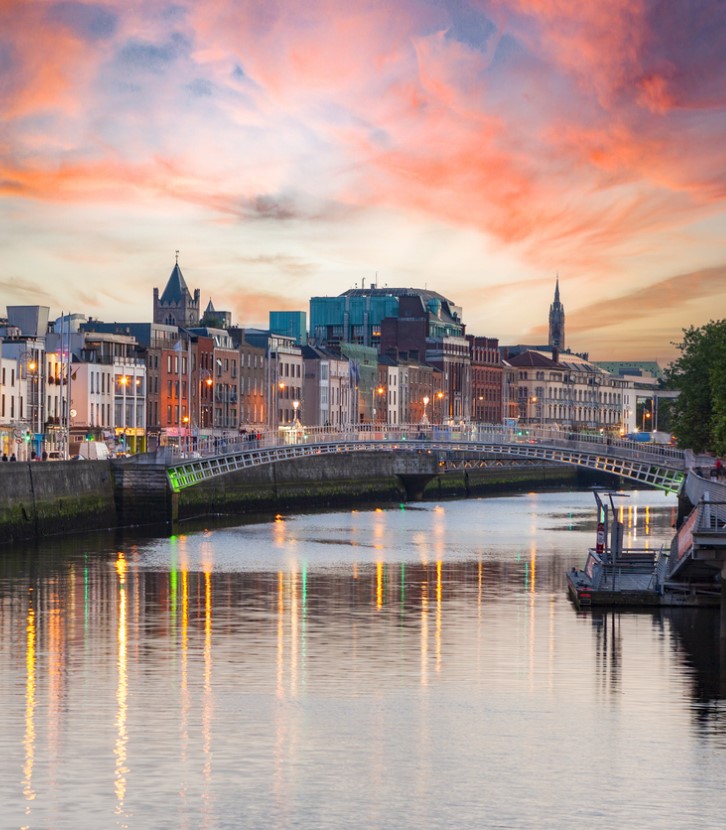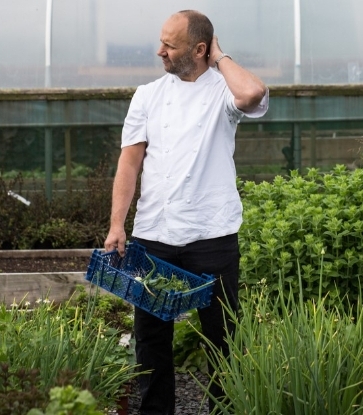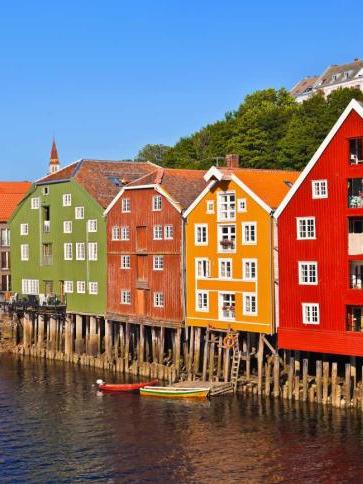To coincide with the release of the Nordic Countries Guide 2020, Michelin has launched its new Sustainability Emblem for the Nordic Countries (Denmark, Finland, Iceland, Norway and Sweden) on the Michelin Guide website https://guide.michelin.com/en.
Those at the forefront with their sustainable gastronomy practices are highlighted by a new symbol, with the restaurant’s vision also outlined via a quote from the chef. For other restaurants taking smaller steps to work in a greener way, there are short descriptions on their initiatives.
At today’s launch event for the Nordic Countries Guide 2020 in Trondheim, Norway, Gwendal Poullennec, International Director of the Michelin Guides said:
“Today, sustainability is moving increasingly to the forefront of people’s mind, and nowhere more so than in the Nordic Countries, where they have really embraced sustainability as a way of life. Nordic chefs lead the way when it comes to focusing on local ingredients; taking on a zero-waste, nose-to-tail approach; and reducing both food and packaging waste. They are setting the standard for the rest of the world to follow.”
FINLAND
Chapter, Helsinki
“Sustainability is very important and a large part of our ethos. Part of being sustainable is respecting every single ingredient that we use. We are part of a local biodynamic community farm – and all our fish are on the WWF green list and MSC certified.”
Jord, Helsinki
“We want to show that organic food is not something for a special few but for everyone. It is possible to serve good quality comfort food for a decent price – and take care of the earth at the same time.”
Nolla, Helsinki
“We use common sense to prevent waste which, over time, becomes a trend that everyone benefits from. It's painful to see waste and neglect and, once it is done, we cannot go back. It's simply a mindset and, for us, now a daily routine.”
Ora, Helsinki
“We make use of every part of an ingredient in order to bring flavour and interest to our cooking. We consider ourselves to have a responsibility not just to our suppliers and customers but also to the people who work with us.”
NORWAY
Credo, Trondheim
“Sustainability is a way of living in balance with nature. It is our passion and respect for the environment which leads us to give more than we take. Our chefs regularly spend time at local farms to see first-hand the relationship we have.”
Einer, Oslo
“Our vegetarian menu features organic produce from more than 25 different foragers, farms and local growers. We use everything – including stems, skins and shoots – and our leftover cuts are transformed into snacks.”
FYR Bistronomi & Bar, Oslo
“Our main goal is to be the best we can be when it comes to our core values – both in human welfare, by looking after our employees, and in our animal and environmental welfare, particularly taking care of our soil.”
Rest., Oslo
“We turn food waste into a fine dining experience by rejecting modern consumerism. We marvel at the abundance of brilliant ingredients that never reach a shop or plate and believe that no usable ingredient should be left behind.”
SWEDEN
Agrikultur, Stockholm
“We cook food which will give something back to the world. We serve a menu based on vegetables and focus on lesser cuts and more humble ingredients – but this doesn’t mean we are serving lesser food.”
Bhoga, Gothenburg
“We use local west coast produce and really get to know the suppliers we buy from, with a focus on small organic farms and sustainable seafood. Our mantra is to use everything and waste nothing.”
Etoile, Stockholm
“As a small restaurant we are working to be part of a bigger picture. We challenge our producers and suppliers to be a part of it too, by demanding that their deliveries are smart and sustainable. Together we can make a difference.”
Fotografiska, Stockholm
“We make plants the star of the show, using all of the parts and throwing nothing away. We also practise circular thinking, with a focus on composting, hydroponics, and upcycling; turning potential waste into something useful and often beautiful.”
Gastrologik, Stockholm
“Our restaurant is certified organic but that isn’t enough for us and we constantly strive to be more responsible. We use renewable energy, minimise our food waste by using every part of our produce, and narrow down our use of chemicals and plastics.”
Hotell Borgholm, Borgholm
“We see ourselves as the custodians of this historic hotel and want to contribute to the wellbeing of the island, our staff and the community. We use local materials and craftsmen for our building work and showcase local ingredients on the plate.”
Oaxen Krog, Stockholm
“Sustainability is our life. We encourage the highest levels of animal health and welfare; promote biological diversity in cultivation and agricultural ecosystems; and support sustainability regarding the use of marine resources.”
PM & Vanner, Vaxjo
“Over 20 years we have constantly intensified our use of regional organic produce, enhancing relationships with our growers, butchers, hunters and foragers. We have also developed our own garden and greenhouse, which now produces more than 70 ingredients.”
"Faced with constantly evolving challenges, from production methods, suppliers and waste management, chefs are striving to improve their practices. Often, these initiatives combine the know-how of the older generation of chefs with the creativity and innovation of the younger generation, who are never short of ideas. The Michelin Guide wants to help uncover the most dedicated chefs, who are fully invested in sustainable gastronomy and, therefore, a sustainable society.”Gwendal Poullennec, International Director of the Michelin Guides
DENMARK
Alchemist, Copenhagen
“When it comes to minimizing food waste, the industry has come a long way. I see it as my mission to take the discussion a step further and highlight the bigger picture. If we can make people stop and think, we are on the route towards change.”
Alouette, Copenhagen
“Change comes from within; rather than preach a dogma, we want our guests to discover for themselves what tastes delicious, by making sustainable ingredients’ true values immediately and clearly evident. Sustainability is an easy choice when it tastes good.”
Amass, Copenhagen
“We’re on an unfamiliar journey where flavour still rules but we operate in a more responsible way; laying a better path for our industry’s future. It takes time and effort but it has become so ingrained in us that we now can’t imagine any other way.”
Frederiksminde, Præstø
“For us, sustainability first came about through the sourcing of our ingredients. We wanted to support local farmers/growers and took into consideration seasonality, husbandry and natural flavours. We want to help make the world a better place.”
Hærværk, Aarhus
“Life centres around gaining knowledge, so sustainability is really just about education and learning. We are sustainable in all that we do, even down to our choice of bank; we want to know that the money they look after is being used in a good way.”
KOKS, Leynar
“Sustainability is key in our remote location. Use too much of anything and there's none left for anyone else; take care of nature and it takes care of you. It's obvious which is the right way and which is the wrong way to do things.”
Molskroen, Ebeltoft
“A collaboration with a local organic farmer enables me to place my identity on the cooking. Working in a sustainable way means happy guests and our all-encompassing sustainability programme also ensures the well-being of the team.”
Moment, Rønde
“We work mindfully and aim for zero waste, as we can only improve our ecosystem if we reduce what we discard. We believe that humans can work in a constructive partnership with nature and we collaborate with Danish scientists to formulate guidelines for the future.”
Noma, Copenhagen
“Sustainable practices have long served as a guiding light for our creativity, but it’s not just about the way we source ingredients or minimise our carbon footprint; it is also about establishing the best work environment possible for the well-being of our employees.”
108, Copenhagen
“We have devised a mentorship programme to support members of the team and this is something we are really proud of. Creating a platform where people can receive support is important to me; I want others to fulfil their dreams, just as I have.”
Relæ, Copenhagen
“We want to offer a gastronomic experience that is sustainable, from the planting of the seed to the food on the plate. Each and every interaction needs to be examined and judged to be responsible.”
Michelin Nordic Countries Restaurants Taking Positive Steps Towards Sustainability:
Denmark
Aamanns 1921, Copenhagen – Taking a stand regarding animal welfare
Bryghuset Vendia, Hjorring – Waste from the brewery is sent to a farmer to be used as feed
Frederiksgade 42, Aarhus – Powered by a sustainable source (wind)
Gastromé, Aarhus – Turn seaweed from the beach into compost
Høst, Copenhagen – Part of a project to make the city carbon neutral
Henne Kirkeby Kro, Henne – Use a Long John cargo-bike for shopping
Kødbyens Fiskebar, Copenhagen – Always use sustainably sourced fish
Kong Hans Kaelder, Copenhagen – Protect and promote biodiversity in both field and sea
Nordisk Spisehus, Aarhus – Recycle organic waste
The Pescatarian, Copenhagen – Ferment and preserve to help reduce waste
Radio, Copenhagen – Aim to minimise water use in growing and cooking
Selma, Copenhagen – Beers are on tap to reduce the use of glass bottles
Vaekst, Copenhagen – the restaurant operates on solar power
Finland
Grön, Helsinki – Plant-based cooking using local ingredients
Natura, Helsinki – Have taken steps to reduce their electricity consumption
Savoy, Helsinki – Keep bees and produce their own honey
Vinkkeli, Helsinki – Take the origins of produce very seriously
Norway
Fagn, Trondheim – Have their own fisherman, farmer and forager
Lysverket, Bergen – Source seafood within Marine Research Institute guidelines
Plah, Oslo – A local, biodynamic farmer grows their Thai herbs and veg
Sweden
Bloom in the Park, Malmo – Run sustainability classes in local schools
Daniel Berlin, Skane Tranas – Kitchen waste is used to make fertiliser for the garden
Fiskekrogen, Gothenburg – They champion sustainable agriculture
Hillenberg, Stockholm – Food waste is turned into biogas
Koka, Gothenburg – They source only from sustainable suppliers
Lux Dag for Dag, Stockholm – Hold dinners where suppliers present their produce
Namu, Malmo – Avoid using disposable materials
Sturehof, Stockholm – Operate their own fishing boats in the Baltic Sea
Thornstroms Kok, Gothenburg – Produce is sourced locally
Västergatan, Malmo – Vegetables are the star of the show






















